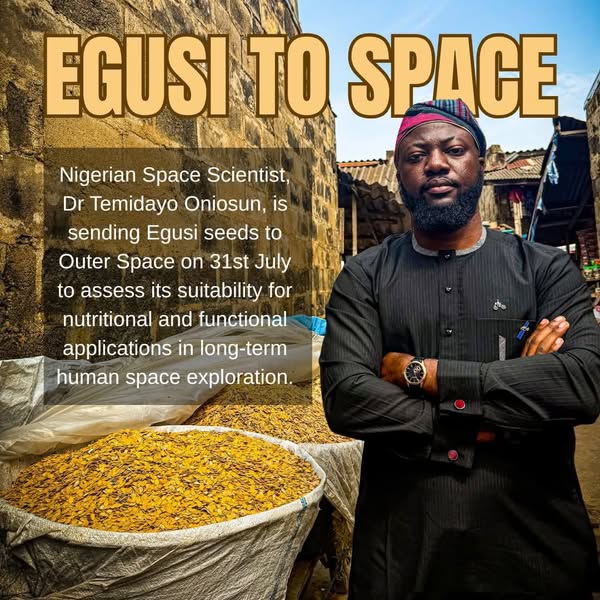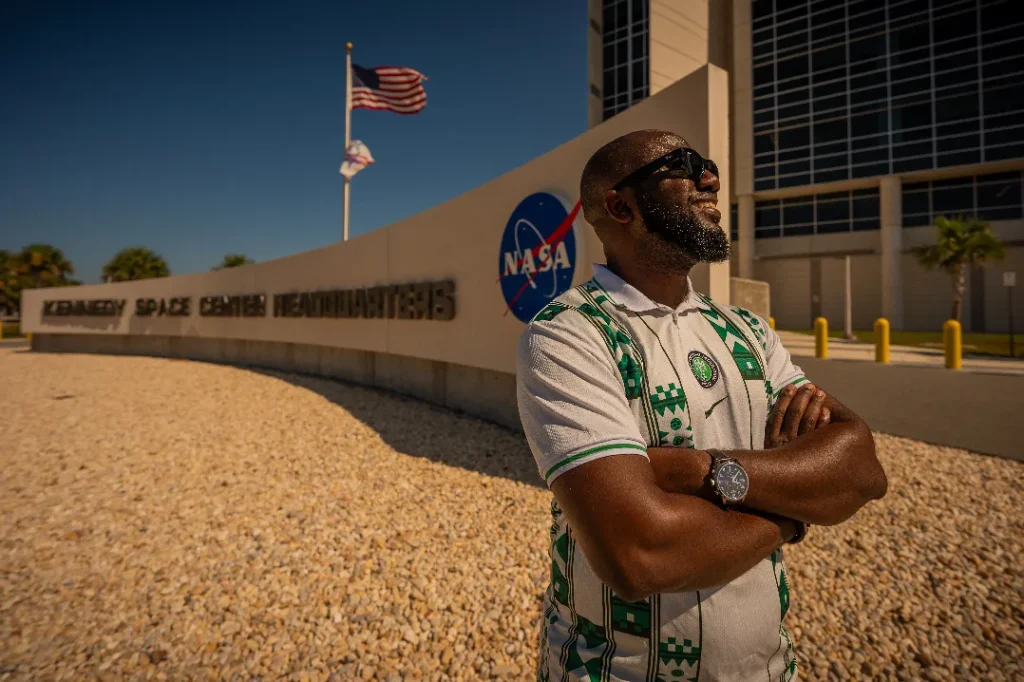By Abdallah el-Kurebe | July 30, 2025 | A historic leap for African science and innovation has been made by a Nigerian space scientist and Federal University of Technology Akure (FUTA) alumnus, Temidayo Oniosun. He is sending Egusi seeds — a beloved West African delicacy — into outer space as part of a pioneering agricultural research experiment.
The mission, which will launch on July 31 at 12:09 PM EDT (5:09 PM Nigerian time) from Cape Canaveral, Florida, aboard NASA’s Crew-11 resupply flight to the International Space Station (ISS), marks the first time in history that seeds from Nigeria will be sent into space.

Backed by The Karman Project and Jaguar Space LLC, the experiment is designed to test the nutritional viability and functional potential of Egusi in long-term human space missions. The Egusi seeds, sourced from Oyo State, are being flown as part of a global push for sustainable food systems in future extraterrestrial habitats such as the Moon or Mars.
Oniosun, a celebrated figure in Africa’s space tech community, explained the deeper mission behind the project:
“I am sending Egusi seeds to outer space to assess their suitability for nutritional and functional applications in long-term human space exploration. This is the first time in history seeds from Nigeria will be going to space.”
Once returned to Earth, the seeds will be subjected to comprehensive laboratory testing in partnership with Dr. Wagner Vendrame, a University of Florida professor renowned for his work in plant micropropagation and cryopreservation. Post-flight analysis will include:
- In vitro germination to detect physiological or genetic mutations,
- Spectral imaging for viability checks,
- Respirometer tests to evaluate metabolic activity,
- Molecular analysis led by a Brazilian partner to decode gene expression changes.
“This research goes beyond agriculture,” Oniosun added. “It’s about food security, adaptability, and scientific sovereignty in space exploration. If Egusi can survive and thrive after exposure to space, it opens new doors for indigenous crops in extra-terrestrial agriculture.”
The scientific community has praised the initiative for both its innovation and cultural significance. Egusi, a nutrient-rich melon seed used in soups across West Africa, represents an important step toward food diversity in space-based agriculture.
FUTA Vice Chancellor Prof. Adenike Oladiji hailed the development, noting that it reflects the global potential of African academia:
“The world watches not just a rocket launch, but a symbol of African innovation hurtling beyond Earth’s atmosphere — seeded by home-grown potential, nurtured by academic excellence at FUTA, and now touching the stars.”
About Temidayo Oniosun:

A 2016 graduate of meteorology from FUTA, Oniosun earned a master’s degree in satellite applications from the University of Strathclyde, Glasgow, and a Ph.D. from the University of Delaware. He is a respected space policy strategist and the founder of Space in Africa, a leading platform on space technology in Africa.
In 2015, Oniosun led FUTA’s space club in launching a high-altitude balloon experiment. He later received the International Astronautical Federation Emerging Space Leadership Award in 2016 and served two terms as Africa Coordinator of the Space Generation Advisory Council.
In 2024, he returned to Nigeria as a technical advisor for Nigerian Satellite Communications Limited, offering insights on strengthening Nigeria’s role in the $20 billion African space industry.
With this Egusi experiment, Temidayo Oniosun not only breaks scientific ground but also plants a seed of hope for Africa’s future in space exploration.


![[BREAKING] Nigerian scientist Oniosun makes history, blasts egusi seeds into space](https://ashenewsdaily.com/wp-content/uploads/2025/07/Temidayo-Oniosun1-768x512.webp)